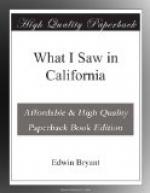September 14.—We crossed the Coscumne River about a mile from our camp, and travelled over a level plain covered with luxuriant grass, and timbered with the evergreen oak, until three o’clock, when we crossed the Mickelemes River, another tributary of the Sacramento, and encamped on its southern bank in a beautiful grove of live oaks. The Mickelemes, where we crossed it, is considerably larger than the Coscumnes. The soil of the bottom appears to be very rich, and produces the finest qualities of grasses. The grass on the upland is also abundant, but at this time it is brown and dead. We passed through large tracts of wild oats during the day; the stalks are generally from three to five feet in length.
Our Indian servant, or vaquero, feigned sickness this morning, and we discharged him. As soon as he obtained his discharge, he was entirely relieved from the excruciating agonies under which he had affected to be suffering for several hours. Eating his breakfast, and mounting his horse, he galloped off in the direction of the fort. We overtook this afternoon an English sailor, named Jack, who was travelling towards Monterey; and we employed him as cook and hostler for the remainder of the journey.
A variety of autumnal flowers, generally of a brilliant yellow, are in bloom along the beautiful and romantic bunks of the rivulet. Distance 25 miles.
September 15.—Our horses were frightened last night by bears, and this morning, with the exception of those which were picketed, had strayed so far that we did not recover them until ten o’clock. Our route has continued over a flat plain, generally covered with luxuriant grass, wild oats, and a variety of sparkling flowers. The soil is composed of a rich argillaceous loam. Large tracts of the land are evidently subject to annual inundations. About noon we reached a small lake surrounded by tule. There being no trail for our guidance, we experienced some difficulty in shaping our course so as to strike the San Joaquin River at the usual fording place. Our man Jack, by some neglect or mistake of his own, lost sight of us, and we were compelled to proceed without him. This afternoon we saw several large droves of antelope and deer. Game of all kinds appears to be very abundant in this rich valley. Passing through large tracts of tule, we reached the San Joaquin River at dark, and encamped on the eastern bank. Here we immediately made large fires, and discharged pistols as signals to our man Jack, but he did not come into camp. Distance 35 miles.
September 16.—Jack came into camp while we were breakfasting, leading his tired horse. He had bivouacked on the plain, and, fearful that his horse would break loose if he tied him, he held the animal by the bridle all night.




